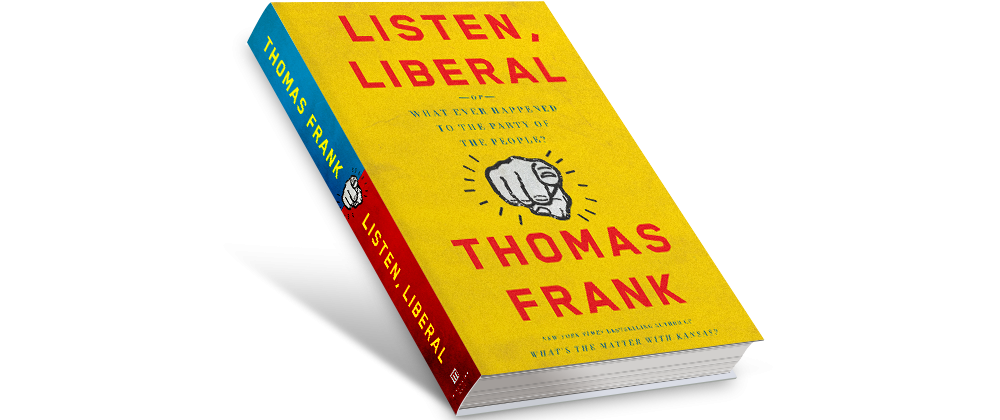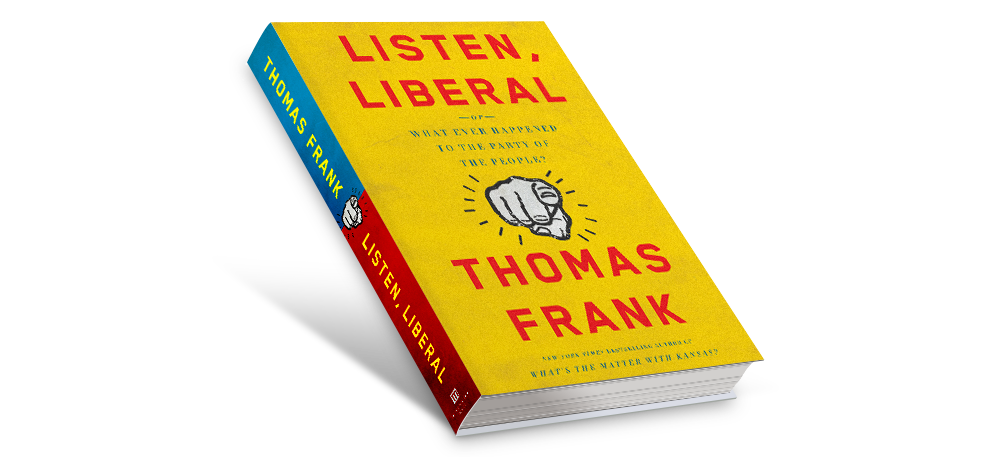

Nathan Robinson, the editor of Current Affairs, starts his interview with author Thomas Frank by quoting from Frank’s 2016 book Listen, Liberal:
“Now all political parties are alliances of groups with disparate interests, but the contradictions of the Democratic Party coalition seem unusually sharp. The Democrats posture as the party of the people, even as they dedicate themselves everywhere, resolutely, to serving and glorifying the professional class. Worse, they combine self-righteousness and class privilege in a way that Americans find stomach turning. But every two years, they simply assume that being non-Republican is sufficient to rally the voters of the nation.”
Wow!
We learn that Frank loves writing history. (I used his book The Conquest Cool in a course on the history of consumer culture that I taught about twenty years ago):
“…I love writing history. I just love it. I love doing archival research. And even before we get into the politics here, I should mention where I’ve been the last couple of years. People are like, where you been? Why haven’t you been writing? I’ve been working on a book. I write every day, and it’s a history of creativity. I’m really deep in the subject right now. I took a break from it to write that op-ed for the Times and to do podcasts. In two days, I will go back to doing that. I really like archival research. I love it. It’s become a lot more efficient with the internet. When I wrote my first book, which was sort of similar to this book about the advertising industry in the 1960s, it was hard to do research. You had to spend all your time in the library, and you had to go to New York City and interview people and go through special files, and it’s all online now, or not all, but like 90 percent. Anyhow, that’s my first passion.”
How did the Democratic party abandon the working class? When did it happen? Here’s Frank:
So it goes back, actually, to the McGovern years, when in ’72, the Democratic Party deliberately wrote organized labor out of the party. They reorganized the way that the Party chose its presidential nominee, and along the way, they basically contrived to take all the power from organized labor, which used to be very closely associated with the Democratic Party. If you’re old enough to remember, they were basically their party, and the McGovern people contrived to kick them out. They did it with the best of motives, let’s put it that way. They did it with the best of motives, but they also did it with some pretty shitty motives.
And you go back and look at the literature of that campaign and of that moment, and they were already saying, we cannot be this party of labor. We have to be the party of enlightened professionals, of the kids coming out of Yale Law School. People were actually saying things like this at the time, and the Party has been working out of that theory ever since. What’s funny is, I don’t know too many people that have critiqued that theory. I think I can count them. This is me, I’m one of them. Listen, Liberal is one of those books. But there’s maybe five others. It’s like it happened and nobody paid any attention to it, even though it was on TV. You had guys saying this nonsense on TV after every election. You had Bill Clinton boasting about it, but there were very few critiques of it. And now here we are. It’s been allowed to run for 50 years.
Frank on populism:
I’m from Kansas. Populism means something there. It was a movement that we had in Kansas. It’s a well-known thing. Even if people don’t know the details, they know that it existed. They know what it was, roughly. It was a left-wing farmer labor movement a long time ago that swept over the state and then disappeared. Everybody knows those basic facts. When I was in graduate school, I decided it would be my subject. I would study it, and I did. I studied it for several years, and then I gave up on it because everybody was writing about populism back then.
This is in the ’80s. Everybody was writing about populism. It just felt pointless to add another monograph on top of this already gigantic pile of essays and books about American populism, but it’s always been the motif of my political writing. In addition to it being important because I come from Kansas, populism is also important because it’s the beginning of the modern left in American life. This is literally where it starts, with the Populist Party. They’re the first ones to actually start calling for a regulated economy, nationalization of things, votes for women, among other things. To basically formulate economic policy in the interests of ordinary people rather than in the interest of big business. That was unthinkable at the time. That was revolutionary. It was absolutely new, and it was shocking, and they were more or less beaten down.
But it was also the beginning, and it later grew and flowered into what we know as the New Deal and the Roosevelt administration. And this became what the Democratic Party was about, up to Lyndon Johnson. Johnson’s grandfather, by the way, was an actual uppercase “P” Populist in the Texas Legislature. It’s neither here nor there, but this is the backdrop of everything that I know about American politics. In What’s the Matter with Kansas?, I was describing the people who were once the rank-and-file of populism being drawn over to the other side, and that it was being done with language that sounded populist.
So this is an important distinction. It feels like I’ve lost it here, but it’s fake populism. So the Republicans use populist language all the time. You go back to Reagan. They did it with George W. Bush, and this is one of the reasons he annoyed me so much. They did it all the time, but they always did it in a cultural sense. You might remember George W. Bush with his pork rinds and touring the country with the country singers. This crap. And Reagan was very good at doing this act as well, but it’s always an act. At some point, I lost control of this, and people just started calling it right-wing populism, and they started using the word populist as a synonym for racist, and then they started using the word populist as a synonym for fascist.
Frank on Richard Hofstadter’s view of populism:
So Richard Hofstadter, famous American historian who—let the record show—when I was younger, I really admired. He’s a great writer, and he’s a brilliant thinker, but he was wrong. And by the way, this is not just me. A lot of other American historians have gone down this road.
For example, Christopher Lasch, who was his protégé and loved him, and then later started writing about populism himself. And what everybody comes to realize is that Hofstadter was wrong about populism. His interpretation of it was a caricature, and it was a stereotype. He had his examples, but they were cherry-picked. This is something we have a lot of experience with. His examples were cherry-picked, and his depiction of populism was completely incorrect, and historians basically figured this out right away after his book came out, but they’ve never been able to stop it—again, it’s an idea that can’t be stopped by its own errors. This is now the second time we’ve talked about this.
The reason his anti-populism works is it’s so flattering. His idea of, how do you get reform? So he’s writing in the 1950s and coming out of this background, and the New Deal is basically over. We’re in the Eisenhower era, and the great universities are coming up. They’re expanding by leaps and bounds, and you have this whole new class of highly educated people being put in charge of everything. Daniel Bell also writes about this. All of these guys, intellectuals in the ’50s, wrote about this. So how do you make reform? Well, according to Bell and Hofstadter and the rest of the sort of consensus gang, the way you make reform is you get a bunch of these guys around a table in Washington, D.C., and you decide on the reform. That’s the professional model of reform. And that’s where the Democratic Party is today. That’s what they believe in.
But what Hofstadter wanted to make toxic and make off-limits so that we would never try to do it again was the opposite model, the populist model, where reform comes from the bottom up. That’s what populism was. It was a mass movement of ordinary people, where the idea was, we have to educate everyone so that they understand the issues because it’s a democracy, and we all have to participate. That was the populist model, and initiative and referendum came out of that and all these other things. Once you tell yourself that’s actually racism—when you put that off-limits to yourself, you’ve made a colossal mistake. You made a colossal choice, let’s put it that way. You’ve made a choice. It’s a bad choice, but that’s the choice that we have made. And all of these debates about populism are not idle, and they’re not just about history. They’re not just about something 100 years ago. They’re about how to go forward.
Read the entire interview here.